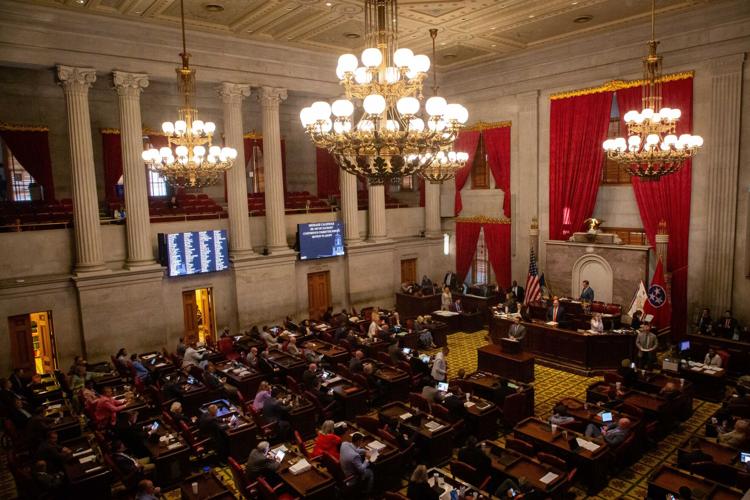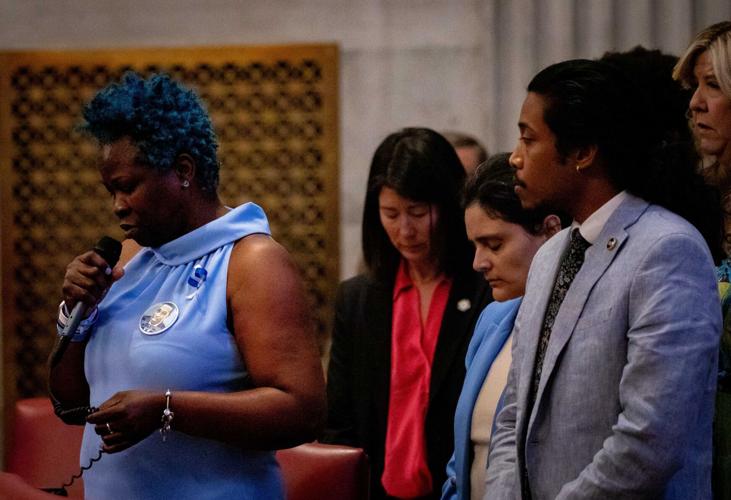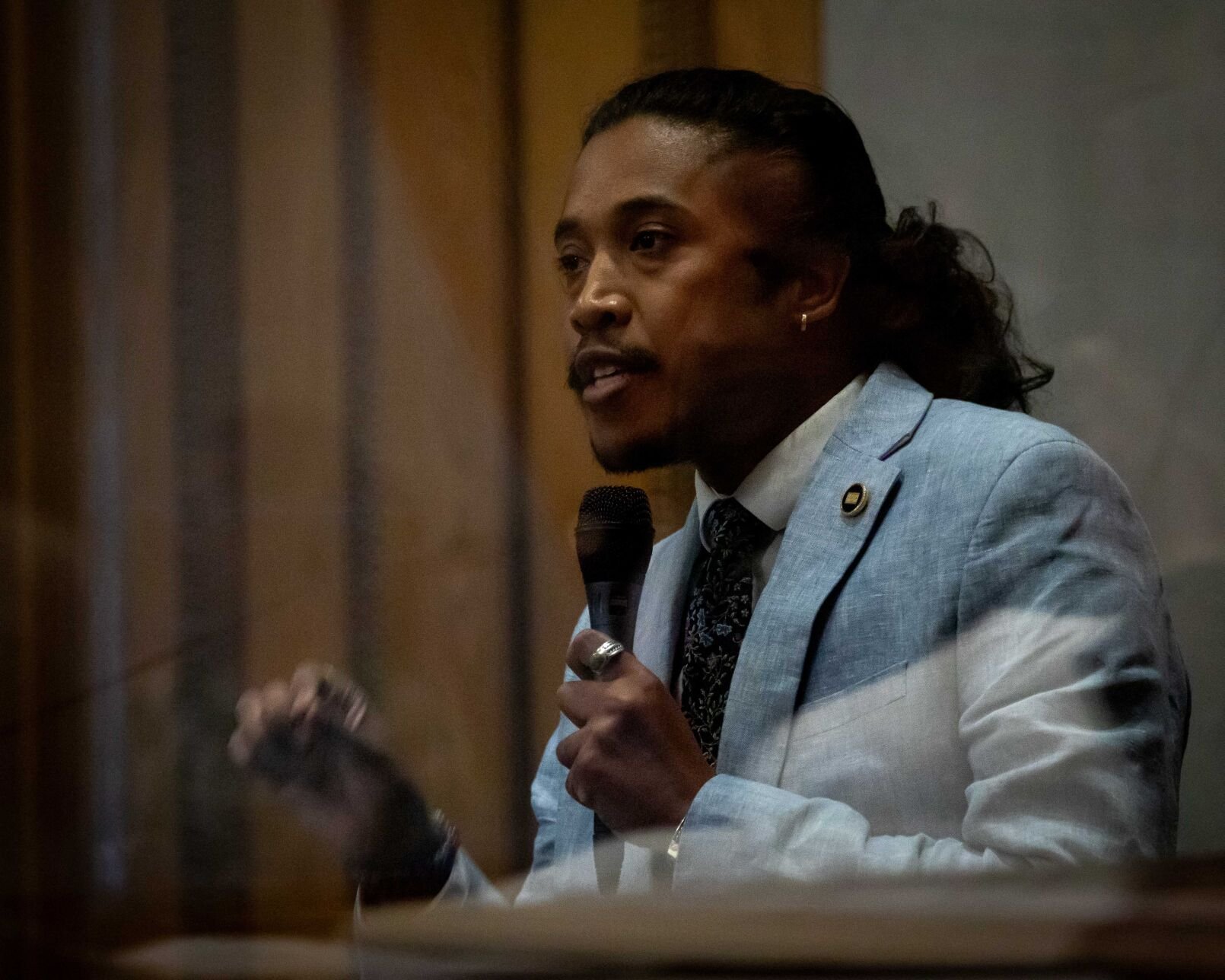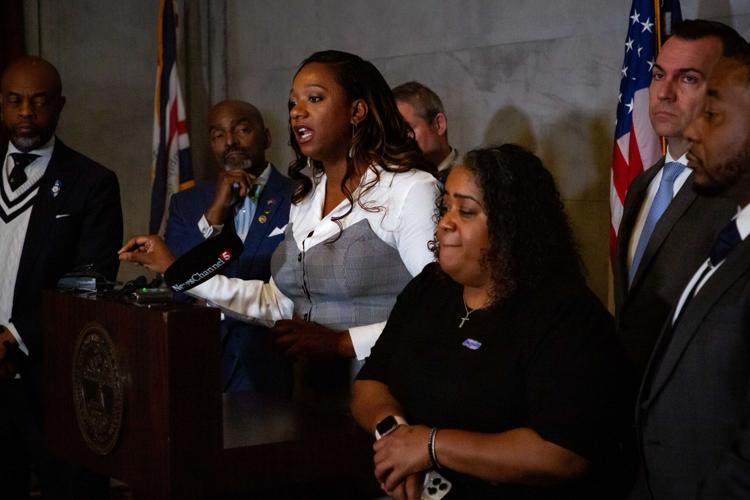The Tennessee General Assembly brought its regular session to an end on Tuesday after passing bills that the state’s Republican supermajority saw fit to become law.
Lawmakers completed their only constitutional requirement — passing a budget — on April 16, and quickly wrapped up other outstanding legislation the following week.

Republican leaders address reporters at the conclusion of the legislative session, April 22, 2025
“I think we have a unique relationship with the governor’s office and the General Assembly,” Gov. Bill Lee said in a press conference following the session's conclusion. “The branches of government work together for the good of the people. There has been much debate and there have been bills that passed, bills that didn’t pass. And at the end of the day, we passed a budget that was incredibly important to steward taxpayer dollars in a way that serves Tennesseans.”
"This session was defined by a few discriminatory pieces of legislation, unfortunately, and a continued attack on public education," House Democratic Caucus Chair John Ray Clemmons (D-Nashville) told reporters.
Among this session’s passed legislation:
- HB 910 dissolving the Tennessee Human Rights Commission
- HB 749 invalidating out-of-state driver’s licenses for undocumented immigrants
- HB 1096 prohibiting businesses from entering community benefits agreements if they receive state economic development funding
- SB 1079 allowing condominium developers to utilize deposit funds for the costs of building
- SB 1084 prohibiting government departments and public universities from having offices of diversity, equity or inclusion
- SB 799 requiring political parties to nominate candidates via a primary election for state and federal offices
Controversial legislation costs nearly half of $910 million budget passed for governor’s priorities
The legislature also passed resolutions that will allow Tennesseans to vote on three constitutional amendments in 2026 regarding the right to bail, victims' rights and a permanent ban on any future state property tax.
Some of the legislation that gained the most attention this year was passed during a special session in January focusing on education, immigration and disaster relief. Legislators during that session passed the $400 million-plus Education Freedom Act, creating 20,000 scholarships for students’ private school tuition and other educational expenses. But Gov. Lee’s voucher bill was not a landslide victory, with 21 House Republicans and seven Senate Republicans joining Democrats to vote against the bill in late January.
Republican leadership tightened the reins during the regular session, with many prominent bills passing along party lines. One Republican-sponsored bill would have allowed school districts to exclude students based on immigration status, but it ultimately stalled in the committee process in the House. The legislation was met with fierce opposition from Democrats and numerous protests at the Capitol. Some Republicans, including Sen. Ferrell Haile (R-Gallatin), crossed party lines to oppose the bill as it moved through the Senate.
Legislation heading for Senate floor following discussion of its financial impact
Democrats had a hard time moving just about any legislation through committees — even a simple bill by Rep. Antonio Parkinson (D-Memphis) to recognize the song “Tennessee” by Arrested Development was voted down by the Republican majority in the State and Local Government Committee early in the session.
"We are here to serve the people," said Senate Minority Leader Raumesh Akbari (D-Memphis) at the close of the session. "We're not here to serve political interests. We're not here to serve corporate interests. We're here to pass policy that impacts people, that makes them feel safe and makes them feel secure, and unfortunately, I think too many pieces of our legislation missed the mark."

Rep. Shaundelle Brooks speaks on the House floor, April 22, 2025
Originally there was bipartisan support for a bill from Rep. Shaundelle Brooks (D-Nashville) named for her son, Akilah DaSilva, who was shot and killed during the Waffle House mass shooting in Antioch in 2018. Akilah's Law would hold accountable people who provide a gun to someone who is not allowed to possess one by law. But ultimately, no action was taken the last time the bill was brought in front of the House Judiciary Committee.
A bill that did garner enough bipartisan support to pass, the Fertility Treatment and Contraceptive Protection Act, will codify rights to access fertility treatments and contraceptives, and for health care providers to give such care. A bill that names some instances in which an abortion could be considered legal passed both chambers this year, though it drew ire from Democrats who said it was just a way for the state attorney general to avoid a lawsuit.
Additional reporting by Julianne Akers.













